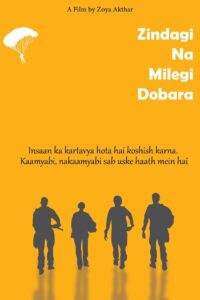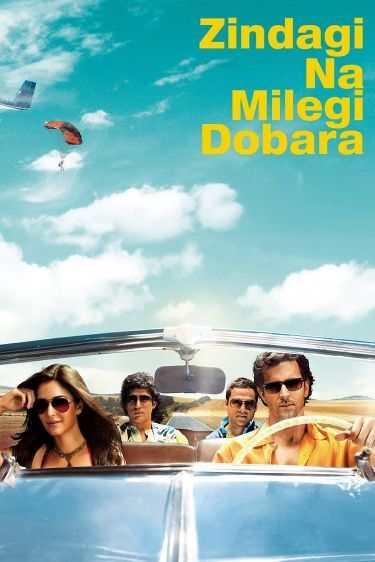A Journey Through Life, Friendship, and Self-Discovery
Rating: ★★★★★
When you watch Zindagi Na Milegi Dobara, you’re not just watching a film—you’re embarking on a journey. A journey that takes you through the breathtaking landscapes of Spain, the depths of human emotion, and the essence of what it truly means to live. Directed by Zoya Akhtar, this 2011 cinematic masterpiece has left an indelible mark on the hearts of millions, and for good reason. It’s a film that beautifully encapsulates the spirit of friendship, the importance of living in the moment, and the courage it takes to confront one’s fears.
Plot Overview: A Tale of Friendship and Fear
The story revolves around three childhood friends—Kabir (Abhay Deol), Arjun (Hrithik Roshan), and Imran (Farhan Akhtar)—who reunite for a three-week road trip across Spain. This trip is not just a regular holiday; it’s a bachelor trip for Kabir, who is soon to be married to Natasha (Kalki Koechlin). Each friend gets to choose one adventure sport for the group, an activity that pushes them out of their comfort zones and forces them to confront their deepest fears.
As they travel through Spain, they embark on experiences that are both thrilling and transformative. From deep-sea diving in Costa Brava to skydiving in Seville and participating in the Running of the Bulls in Pamplona, each activity is a metaphor for the internal journeys they undertake. These adventures act as catalysts, pushing them to confront their unresolved issues and, ultimately, rediscover themselves.
Character Analysis: Layers of Complexity
Kabir Dewan is the glue that holds the group together. His character is portrayed with a sense of maturity and a deep understanding of relationships. Kabir is the one who suggests the trip, knowing deep down that this might be their last chance to reconnect before life takes them in different directions. However, his impending marriage brings its own set of complexities. Kabir’s struggle with commitment and the pressure of societal expectations is something many can relate to.
Arjun Saluja, played with intense vulnerability by Hrithik Roshan, is a workaholic financial trader living in London. Arjun’s life is defined by his career, and he views time as a commodity. His obsession with work stems from a fear of poverty, something he experienced during his childhood. The trip becomes a journey of healing for Arjun, as he learns to let go of his fears and embrace life in the present moment. The romance between Arjun and Laila (Katrina Kaif) adds a beautiful layer to his character, as Laila’s free-spirited nature helps him break free from his self-imposed shackles.
Imran Qureshi, portrayed by Farhan Akhtar, is the film’s heart and soul. Imran is a copywriter by profession, but more importantly, he is a poet at heart. His character carries a hidden pain—the unresolved issue of his estranged father, Salman Habib (Naseeruddin Shah). Imran’s journey in the film is about confronting his past and seeking closure. His poetic musings and sense of humor add a unique charm to the film, making his character both relatable and endearing.
Laila, played by Katrina Kaif, is the epitome of living in the moment. A diving instructor by profession, Laila’s character is carefree, adventurous, and deeply philosophical. She is the catalyst for Arjun’s transformation, teaching him the importance of living life without regrets. Her famous line, “Seize the day, my friend. Pehle iss din ko puri tarah jiyo, phir chalis ke baare mein sochna,” encapsulates the film’s central theme.
Natasha Arora (Kalki Koechlin), Kabir’s fiancée, is a complex character who brings tension into the group dynamic. Her possessiveness and insecurities add a realistic layer to the portrayal of modern relationships, highlighting the pressures that often come with societal expectations of marriage.
Themes: A Celebration of Life and Living
At its core, Zindagi Na Milegi Dobara is a celebration of life. The film explores several themes that resonate deeply with audiences:
- Friendship: The bond between Kabir, Arjun, and Imran is the backbone of the film. Their relationship evolves as they confront their fears together, and by the end of the trip, their bond is stronger than ever. The film beautifully captures the essence of true friendship—where you are accepted for who you are, with all your flaws and imperfections.
- Fear and Liberation: Each character has his own set of fears—be it Arjun’s fear of losing control, Imran’s fear of facing his past, or Kabir’s fear of commitment. The activities they engage in are not just physical challenges but symbolic representations of the emotional and psychological hurdles they must overcome. The film encourages viewers to confront their fears head-on, as it is only by doing so that one can truly be free.
- Living in the Moment: The phrase “Carpe Diem” (Seize the Day) is not just a theme but a philosophy that the film advocates. Through Laila’s character, the film emphasizes the importance of living in the present and enjoying life as it comes. In a world where we are constantly worried about the future, Zindagi Na Milegi Dobara serves as a reminder to cherish the here and now.
- Self-Discovery: The road trip acts as a metaphor for the characters’ journey of self-discovery. As they explore new terrains, they also explore new facets of their personalities. By the end of the film, each character has undergone a transformation, having discovered something new about themselves and their relationships.
Visual and Musical Grandeur: A Feast for the Senses
The cinematography by Carlos Catalan is nothing short of spectacular. The film takes viewers on a visual journey through the stunning landscapes of Spain, from the serene beaches of Costa Brava to the vibrant streets of Seville and the picturesque countryside. Each location is captured with such beauty that it almost becomes a character in itself, adding depth and richness to the narrative.
The music, composed by the talented Shankar-Ehsaan-Loy, perfectly complements the film’s tone. Songs like “Senorita,” “Khaabon Ke Parinday,” and “Der Lagi Lekin” are not just songs but integral parts of the storytelling. They capture the essence of the characters’ emotions and the mood of the scenes, making the film an auditory delight as well.
Dialogues: Words That Resonate
The dialogues in Zindagi Na Milegi Dobara are not just words spoken by the characters; they are life lessons, nuggets of wisdom that stay with you long after the credits roll. Here are some of the most memorable ones:
- “Dilon mein tum apni betabiyan leke chal rahe ho, toh zinda ho tum. Nigaahon mein khwabon ki bijliyan leke chal rahe ho, toh zinda ho tum.”
This dialogue, delivered by Farhan Akhtar’s character Imran, encapsulates the essence of being alive—holding onto your dreams and passions. - “Zindagi mein agar kuch banna ho, kuch haasil karna ho, kuch jeetna ho… toh hamesha apne dil ki suno. Aur agar dil bhi koi jawaab na de, toh apni aankhein band karke apni maa aur papa ka naam lo, phir dekho har mushkil aasaan ho jaayegi, har raasta saaf ho jaayega.”
A powerful dialogue that speaks to the importance of listening to one’s heart and drawing strength from one’s roots. - “Mujhe afsos karna nahi aata.”
Spoken by Arjun, this line reflects his journey from being a workaholic driven by fear to someone who has learned to embrace life with all its uncertainties. - “Insaan ko dibbe mein sirf tab hona chahiye jab woh mar chuka ho.”
This dialogue by Imran is a profound statement on the importance of breaking free from societal constraints and living life on one’s own terms.
Impact: A Film That Stays With You
Zindagi Na Milegi Dobara is more than just a film; it’s an experience. It’s a reminder that life is short, and it’s up to us to make the most of it. The film resonates with audiences because it speaks to universal human experiences—friendship, love, fear, and the pursuit of happiness.
For many, this film is a wake-up call to reevaluate their lives and priorities. It encourages viewers to break free from the monotony of everyday life, to face their fears, and to live in the moment. It’s a film that inspires you to travel, to reconnect with old friends, and to take that leap of faith—whether it’s in your personal or professional life.
In a world where we are often caught up in the rat race, Zindagi Na Milegi Dobara serves as a much-needed reminder to slow down, take a deep breath, and enjoy the journey. It’s a film that stays with you long after you’ve watched it, leaving you with a renewed zest for life.
Conclusion: A Masterpiece Worth Revisiting
Zindagi Na Milegi Dobara is a film that you can watch over and over again, and each time, it will offer you something new. It’s a film that appeals to all age groups because its themes are universal and timeless. Whether you’re a teenager dreaming of adventure, an adult navigating the complexities of life, or an elder reflecting on past experiences, this film has something to offer.
It’s not just a story about three friends on a road trip; it’s a celebration of life itself. It’s about breaking free from the shackles that hold you back and living life to the fullest because, as the title suggests, “Zindagi Na Milegi Dobara”—You only live once.
So, if you haven’t seen this film yet, do yourself a favor and watch it. And if you have, maybe it’s time to revisit it. After all, life is too short not to enjoy the little things, the big things, and everything in between.

Want to read a bit more? Find some more of my writings here-
Songs of Spiti: A Journey of Six Friends
I hope you liked the content.
To share your views, you can simply send me an email.
Thank you for being keen readers to a small-time writer.







6 Responses
I always find a little bit of joy in your posts.
You make the online world a better place.
This post is a perfect reminder of life’s simple joys.
I really needed this gentle moment of reflection.
I wasn’t expecting to connect with this post so deeply.
But wow—thank you for sharing it.
Very well.
This post made me feel so calm and centered.
I’ll definitely be coming back to reread it.
I love the simplicity and depth in your writing.